Analysis of Keith Hopkins' Solution on Roman Historical Reconstruction
VerifiedAdded on 2022/10/08
|7
|1374
|19
Report
AI Summary
This report provides an analysis of Keith Hopkins' approach to understanding Roman history, emphasizing his sociological perspective and methods of historical reconstruction. It examines his belief in meticulous categorization and the importance of considering both surviving and lost evidence t...
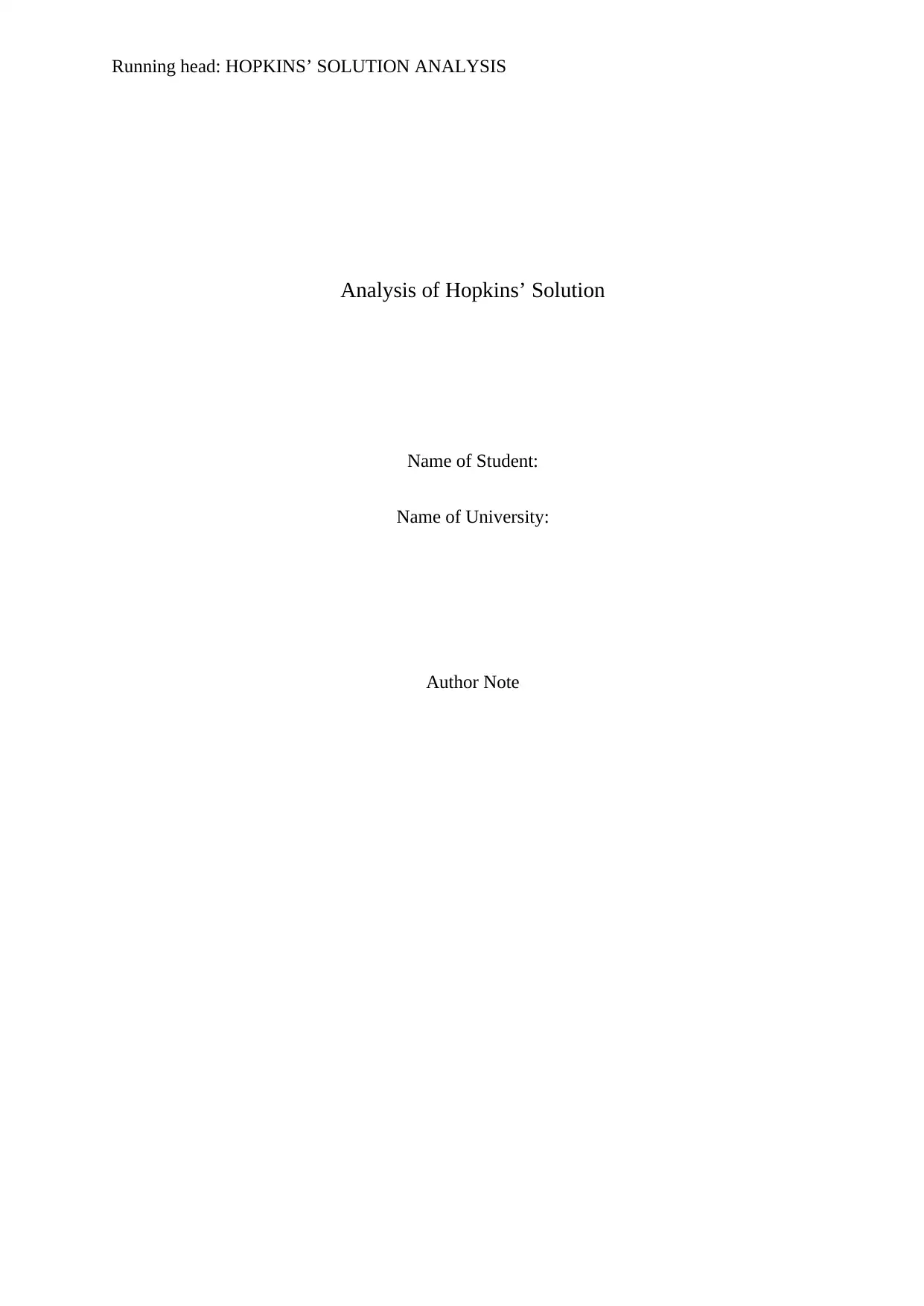
Running head: HOPKINS’ SOLUTION ANALYSIS
Analysis of Hopkins’ Solution
Name of Student:
Name of University:
Author Note
Analysis of Hopkins’ Solution
Name of Student:
Name of University:
Author Note
Paraphrase This Document
Need a fresh take? Get an instant paraphrase of this document with our AI Paraphraser
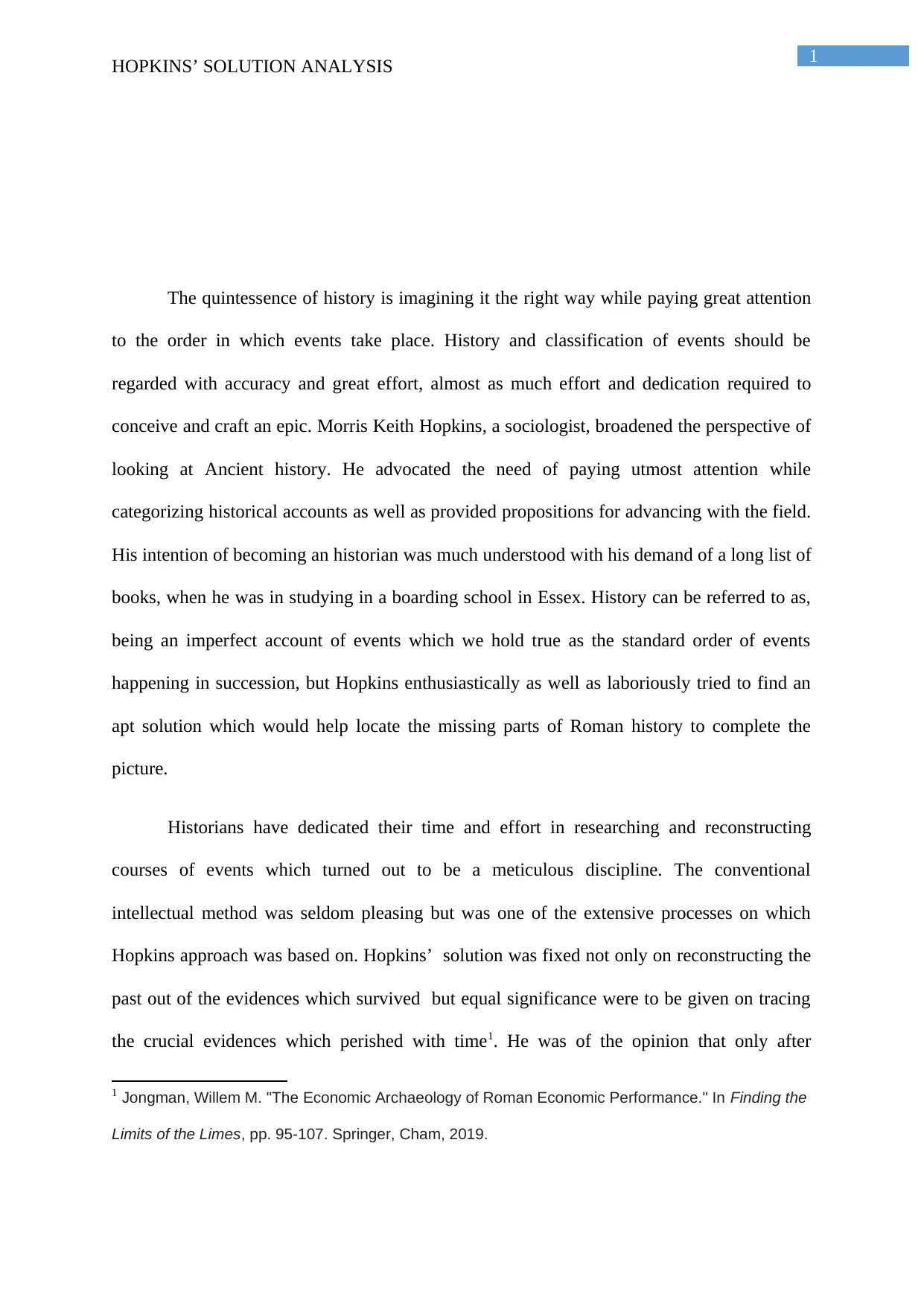
1
HOPKINS’ SOLUTION ANALYSIS
The quintessence of history is imagining it the right way while paying great attention
to the order in which events take place. History and classification of events should be
regarded with accuracy and great effort, almost as much effort and dedication required to
conceive and craft an epic. Morris Keith Hopkins, a sociologist, broadened the perspective of
looking at Ancient history. He advocated the need of paying utmost attention while
categorizing historical accounts as well as provided propositions for advancing with the field.
His intention of becoming an historian was much understood with his demand of a long list of
books, when he was in studying in a boarding school in Essex. History can be referred to as,
being an imperfect account of events which we hold true as the standard order of events
happening in succession, but Hopkins enthusiastically as well as laboriously tried to find an
apt solution which would help locate the missing parts of Roman history to complete the
picture.
Historians have dedicated their time and effort in researching and reconstructing
courses of events which turned out to be a meticulous discipline. The conventional
intellectual method was seldom pleasing but was one of the extensive processes on which
Hopkins approach was based on. Hopkins’ solution was fixed not only on reconstructing the
past out of the evidences which survived but equal significance were to be given on tracing
the crucial evidences which perished with time1. He was of the opinion that only after
1 Jongman, Willem M. "The Economic Archaeology of Roman Economic Performance." In Finding the
Limits of the Limes, pp. 95-107. Springer, Cham, 2019.
HOPKINS’ SOLUTION ANALYSIS
The quintessence of history is imagining it the right way while paying great attention
to the order in which events take place. History and classification of events should be
regarded with accuracy and great effort, almost as much effort and dedication required to
conceive and craft an epic. Morris Keith Hopkins, a sociologist, broadened the perspective of
looking at Ancient history. He advocated the need of paying utmost attention while
categorizing historical accounts as well as provided propositions for advancing with the field.
His intention of becoming an historian was much understood with his demand of a long list of
books, when he was in studying in a boarding school in Essex. History can be referred to as,
being an imperfect account of events which we hold true as the standard order of events
happening in succession, but Hopkins enthusiastically as well as laboriously tried to find an
apt solution which would help locate the missing parts of Roman history to complete the
picture.
Historians have dedicated their time and effort in researching and reconstructing
courses of events which turned out to be a meticulous discipline. The conventional
intellectual method was seldom pleasing but was one of the extensive processes on which
Hopkins approach was based on. Hopkins’ solution was fixed not only on reconstructing the
past out of the evidences which survived but equal significance were to be given on tracing
the crucial evidences which perished with time1. He was of the opinion that only after
1 Jongman, Willem M. "The Economic Archaeology of Roman Economic Performance." In Finding the
Limits of the Limes, pp. 95-107. Springer, Cham, 2019.
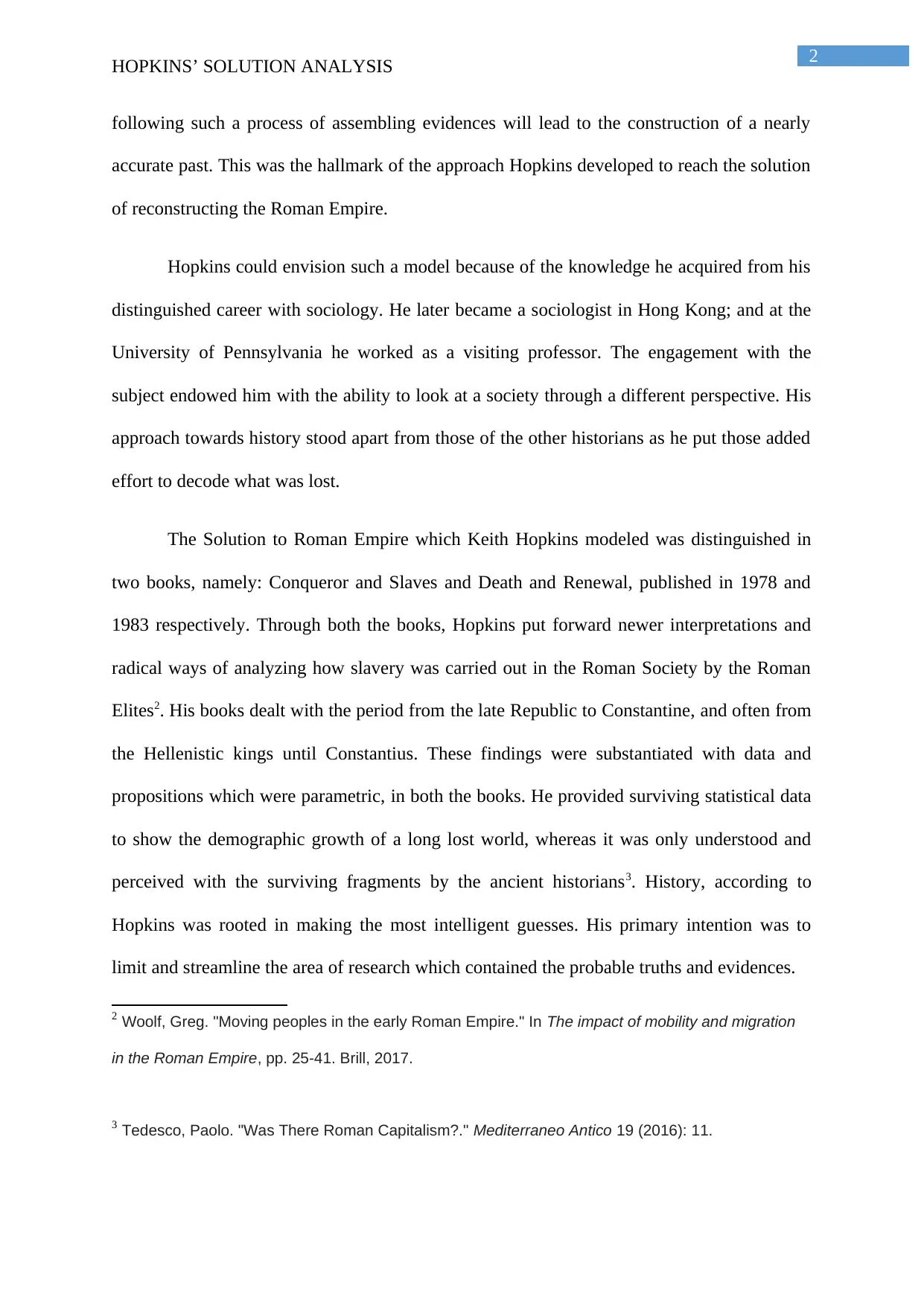
2
HOPKINS’ SOLUTION ANALYSIS
following such a process of assembling evidences will lead to the construction of a nearly
accurate past. This was the hallmark of the approach Hopkins developed to reach the solution
of reconstructing the Roman Empire.
Hopkins could envision such a model because of the knowledge he acquired from his
distinguished career with sociology. He later became a sociologist in Hong Kong; and at the
University of Pennsylvania he worked as a visiting professor. The engagement with the
subject endowed him with the ability to look at a society through a different perspective. His
approach towards history stood apart from those of the other historians as he put those added
effort to decode what was lost.
The Solution to Roman Empire which Keith Hopkins modeled was distinguished in
two books, namely: Conqueror and Slaves and Death and Renewal, published in 1978 and
1983 respectively. Through both the books, Hopkins put forward newer interpretations and
radical ways of analyzing how slavery was carried out in the Roman Society by the Roman
Elites2. His books dealt with the period from the late Republic to Constantine, and often from
the Hellenistic kings until Constantius. These findings were substantiated with data and
propositions which were parametric, in both the books. He provided surviving statistical data
to show the demographic growth of a long lost world, whereas it was only understood and
perceived with the surviving fragments by the ancient historians3. History, according to
Hopkins was rooted in making the most intelligent guesses. His primary intention was to
limit and streamline the area of research which contained the probable truths and evidences.
2 Woolf, Greg. "Moving peoples in the early Roman Empire." In The impact of mobility and migration
in the Roman Empire, pp. 25-41. Brill, 2017.
3 Tedesco, Paolo. "Was There Roman Capitalism?." Mediterraneo Antico 19 (2016): 11.
HOPKINS’ SOLUTION ANALYSIS
following such a process of assembling evidences will lead to the construction of a nearly
accurate past. This was the hallmark of the approach Hopkins developed to reach the solution
of reconstructing the Roman Empire.
Hopkins could envision such a model because of the knowledge he acquired from his
distinguished career with sociology. He later became a sociologist in Hong Kong; and at the
University of Pennsylvania he worked as a visiting professor. The engagement with the
subject endowed him with the ability to look at a society through a different perspective. His
approach towards history stood apart from those of the other historians as he put those added
effort to decode what was lost.
The Solution to Roman Empire which Keith Hopkins modeled was distinguished in
two books, namely: Conqueror and Slaves and Death and Renewal, published in 1978 and
1983 respectively. Through both the books, Hopkins put forward newer interpretations and
radical ways of analyzing how slavery was carried out in the Roman Society by the Roman
Elites2. His books dealt with the period from the late Republic to Constantine, and often from
the Hellenistic kings until Constantius. These findings were substantiated with data and
propositions which were parametric, in both the books. He provided surviving statistical data
to show the demographic growth of a long lost world, whereas it was only understood and
perceived with the surviving fragments by the ancient historians3. History, according to
Hopkins was rooted in making the most intelligent guesses. His primary intention was to
limit and streamline the area of research which contained the probable truths and evidences.
2 Woolf, Greg. "Moving peoples in the early Roman Empire." In The impact of mobility and migration
in the Roman Empire, pp. 25-41. Brill, 2017.
3 Tedesco, Paolo. "Was There Roman Capitalism?." Mediterraneo Antico 19 (2016): 11.
⊘ This is a preview!⊘
Do you want full access?
Subscribe today to unlock all pages.

Trusted by 1+ million students worldwide
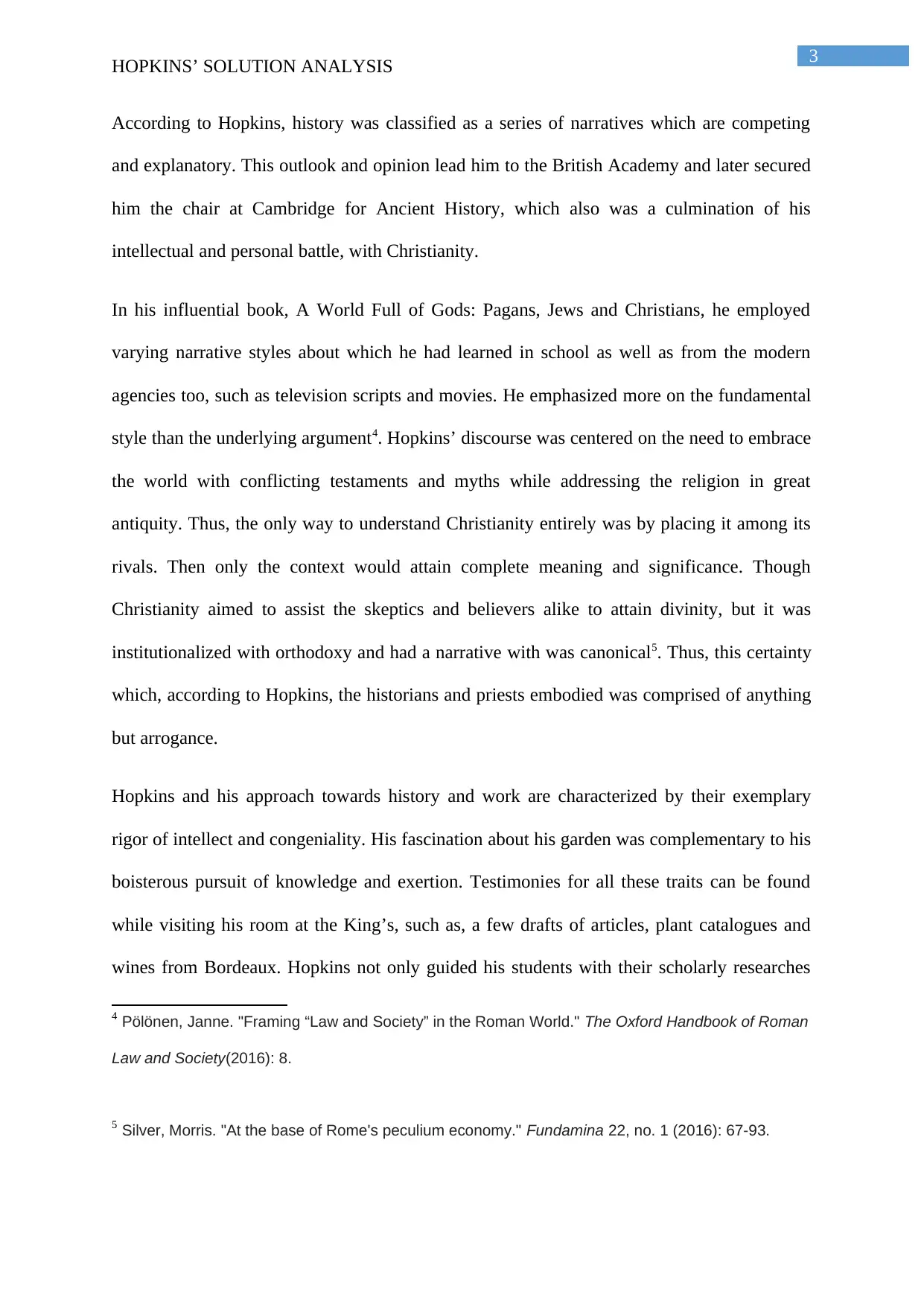
3
HOPKINS’ SOLUTION ANALYSIS
According to Hopkins, history was classified as a series of narratives which are competing
and explanatory. This outlook and opinion lead him to the British Academy and later secured
him the chair at Cambridge for Ancient History, which also was a culmination of his
intellectual and personal battle, with Christianity.
In his influential book, A World Full of Gods: Pagans, Jews and Christians, he employed
varying narrative styles about which he had learned in school as well as from the modern
agencies too, such as television scripts and movies. He emphasized more on the fundamental
style than the underlying argument4. Hopkins’ discourse was centered on the need to embrace
the world with conflicting testaments and myths while addressing the religion in great
antiquity. Thus, the only way to understand Christianity entirely was by placing it among its
rivals. Then only the context would attain complete meaning and significance. Though
Christianity aimed to assist the skeptics and believers alike to attain divinity, but it was
institutionalized with orthodoxy and had a narrative with was canonical5. Thus, this certainty
which, according to Hopkins, the historians and priests embodied was comprised of anything
but arrogance.
Hopkins and his approach towards history and work are characterized by their exemplary
rigor of intellect and congeniality. His fascination about his garden was complementary to his
boisterous pursuit of knowledge and exertion. Testimonies for all these traits can be found
while visiting his room at the King’s, such as, a few drafts of articles, plant catalogues and
wines from Bordeaux. Hopkins not only guided his students with their scholarly researches
4 Pölönen, Janne. "Framing “Law and Society” in the Roman World." The Oxford Handbook of Roman
Law and Society(2016): 8.
5 Silver, Morris. "At the base of Rome's peculium economy." Fundamina 22, no. 1 (2016): 67-93.
HOPKINS’ SOLUTION ANALYSIS
According to Hopkins, history was classified as a series of narratives which are competing
and explanatory. This outlook and opinion lead him to the British Academy and later secured
him the chair at Cambridge for Ancient History, which also was a culmination of his
intellectual and personal battle, with Christianity.
In his influential book, A World Full of Gods: Pagans, Jews and Christians, he employed
varying narrative styles about which he had learned in school as well as from the modern
agencies too, such as television scripts and movies. He emphasized more on the fundamental
style than the underlying argument4. Hopkins’ discourse was centered on the need to embrace
the world with conflicting testaments and myths while addressing the religion in great
antiquity. Thus, the only way to understand Christianity entirely was by placing it among its
rivals. Then only the context would attain complete meaning and significance. Though
Christianity aimed to assist the skeptics and believers alike to attain divinity, but it was
institutionalized with orthodoxy and had a narrative with was canonical5. Thus, this certainty
which, according to Hopkins, the historians and priests embodied was comprised of anything
but arrogance.
Hopkins and his approach towards history and work are characterized by their exemplary
rigor of intellect and congeniality. His fascination about his garden was complementary to his
boisterous pursuit of knowledge and exertion. Testimonies for all these traits can be found
while visiting his room at the King’s, such as, a few drafts of articles, plant catalogues and
wines from Bordeaux. Hopkins not only guided his students with their scholarly researches
4 Pölönen, Janne. "Framing “Law and Society” in the Roman World." The Oxford Handbook of Roman
Law and Society(2016): 8.
5 Silver, Morris. "At the base of Rome's peculium economy." Fundamina 22, no. 1 (2016): 67-93.
Paraphrase This Document
Need a fresh take? Get an instant paraphrase of this document with our AI Paraphraser
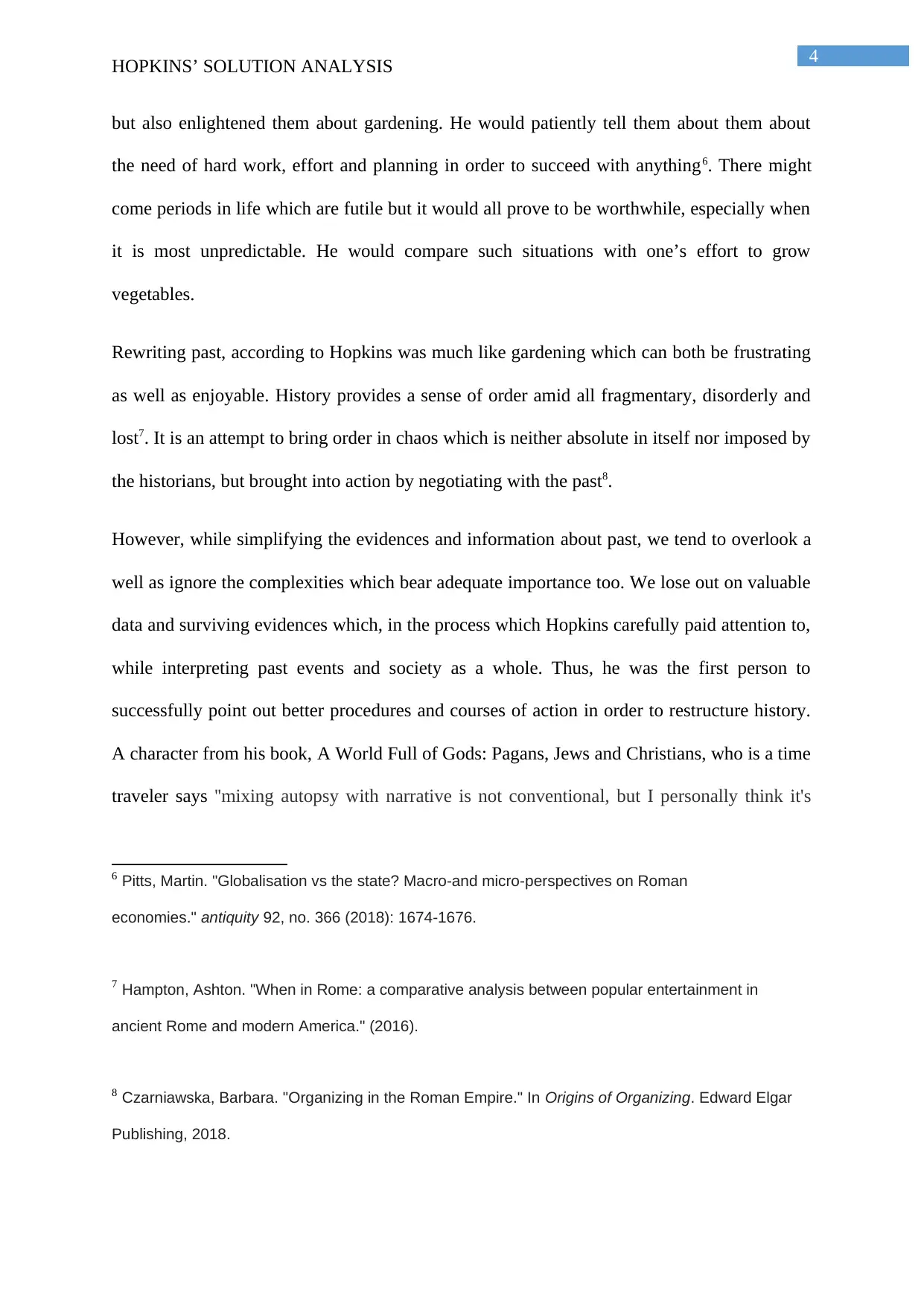
4
HOPKINS’ SOLUTION ANALYSIS
but also enlightened them about gardening. He would patiently tell them about them about
the need of hard work, effort and planning in order to succeed with anything6. There might
come periods in life which are futile but it would all prove to be worthwhile, especially when
it is most unpredictable. He would compare such situations with one’s effort to grow
vegetables.
Rewriting past, according to Hopkins was much like gardening which can both be frustrating
as well as enjoyable. History provides a sense of order amid all fragmentary, disorderly and
lost7. It is an attempt to bring order in chaos which is neither absolute in itself nor imposed by
the historians, but brought into action by negotiating with the past8.
However, while simplifying the evidences and information about past, we tend to overlook a
well as ignore the complexities which bear adequate importance too. We lose out on valuable
data and surviving evidences which, in the process which Hopkins carefully paid attention to,
while interpreting past events and society as a whole. Thus, he was the first person to
successfully point out better procedures and courses of action in order to restructure history.
A character from his book, A World Full of Gods: Pagans, Jews and Christians, who is a time
traveler says ''mixing autopsy with narrative is not conventional, but I personally think it's
6 Pitts, Martin. "Globalisation vs the state? Macro-and micro-perspectives on Roman
economies." antiquity 92, no. 366 (2018): 1674-1676.
7 Hampton, Ashton. "When in Rome: a comparative analysis between popular entertainment in
ancient Rome and modern America." (2016).
8 Czarniawska, Barbara. "Organizing in the Roman Empire." In Origins of Organizing. Edward Elgar
Publishing, 2018.
HOPKINS’ SOLUTION ANALYSIS
but also enlightened them about gardening. He would patiently tell them about them about
the need of hard work, effort and planning in order to succeed with anything6. There might
come periods in life which are futile but it would all prove to be worthwhile, especially when
it is most unpredictable. He would compare such situations with one’s effort to grow
vegetables.
Rewriting past, according to Hopkins was much like gardening which can both be frustrating
as well as enjoyable. History provides a sense of order amid all fragmentary, disorderly and
lost7. It is an attempt to bring order in chaos which is neither absolute in itself nor imposed by
the historians, but brought into action by negotiating with the past8.
However, while simplifying the evidences and information about past, we tend to overlook a
well as ignore the complexities which bear adequate importance too. We lose out on valuable
data and surviving evidences which, in the process which Hopkins carefully paid attention to,
while interpreting past events and society as a whole. Thus, he was the first person to
successfully point out better procedures and courses of action in order to restructure history.
A character from his book, A World Full of Gods: Pagans, Jews and Christians, who is a time
traveler says ''mixing autopsy with narrative is not conventional, but I personally think it's
6 Pitts, Martin. "Globalisation vs the state? Macro-and micro-perspectives on Roman
economies." antiquity 92, no. 366 (2018): 1674-1676.
7 Hampton, Ashton. "When in Rome: a comparative analysis between popular entertainment in
ancient Rome and modern America." (2016).
8 Czarniawska, Barbara. "Organizing in the Roman Empire." In Origins of Organizing. Edward Elgar
Publishing, 2018.

5
HOPKINS’ SOLUTION ANALYSIS
fair.'', which is an almost accurate rendering of Hopkins’ approach of analyzing history and
ways of life.
HOPKINS’ SOLUTION ANALYSIS
fair.'', which is an almost accurate rendering of Hopkins’ approach of analyzing history and
ways of life.
⊘ This is a preview!⊘
Do you want full access?
Subscribe today to unlock all pages.

Trusted by 1+ million students worldwide
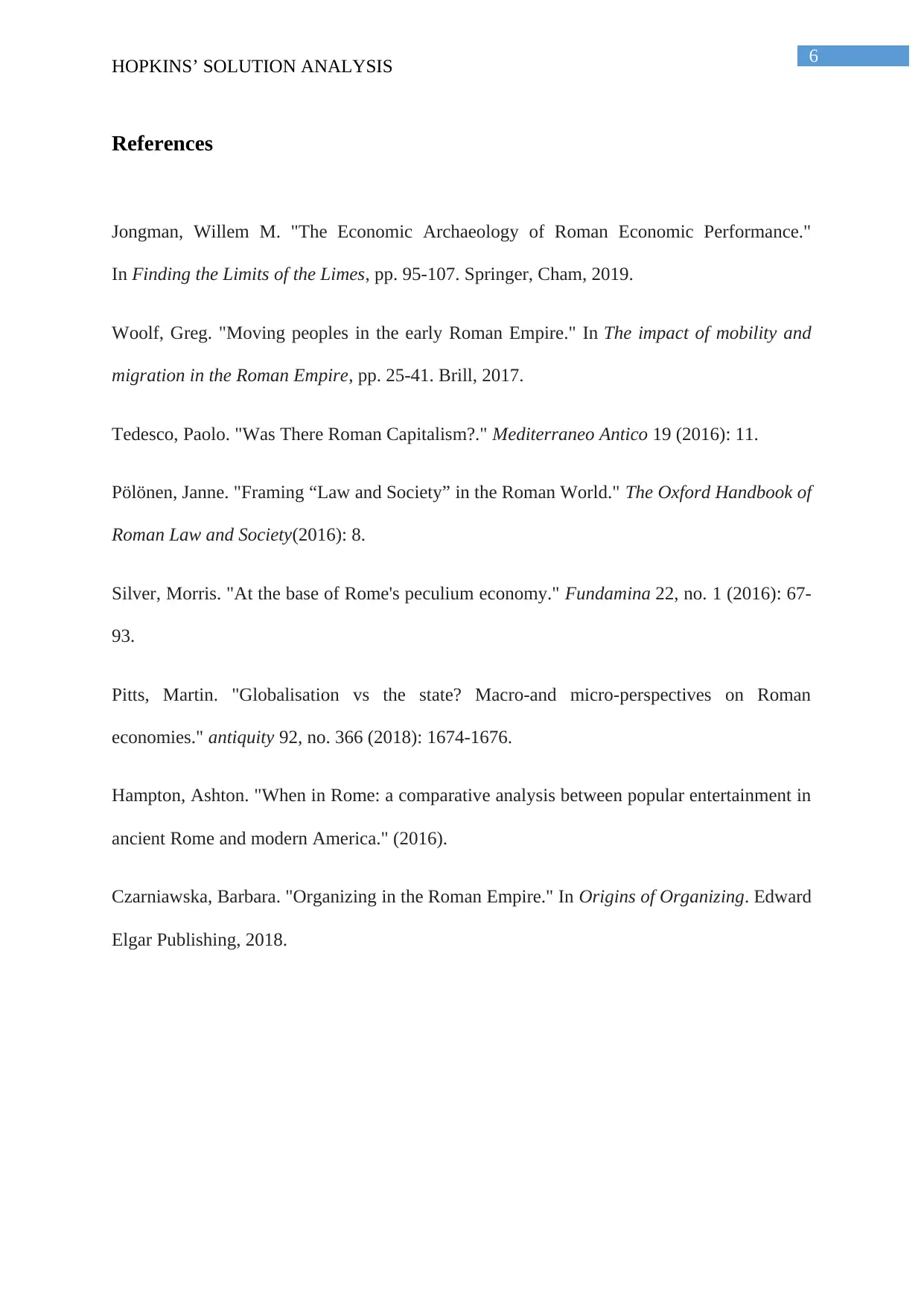
6
HOPKINS’ SOLUTION ANALYSIS
References
Jongman, Willem M. "The Economic Archaeology of Roman Economic Performance."
In Finding the Limits of the Limes, pp. 95-107. Springer, Cham, 2019.
Woolf, Greg. "Moving peoples in the early Roman Empire." In The impact of mobility and
migration in the Roman Empire, pp. 25-41. Brill, 2017.
Tedesco, Paolo. "Was There Roman Capitalism?." Mediterraneo Antico 19 (2016): 11.
Pölönen, Janne. "Framing “Law and Society” in the Roman World." The Oxford Handbook of
Roman Law and Society(2016): 8.
Silver, Morris. "At the base of Rome's peculium economy." Fundamina 22, no. 1 (2016): 67-
93.
Pitts, Martin. "Globalisation vs the state? Macro-and micro-perspectives on Roman
economies." antiquity 92, no. 366 (2018): 1674-1676.
Hampton, Ashton. "When in Rome: a comparative analysis between popular entertainment in
ancient Rome and modern America." (2016).
Czarniawska, Barbara. "Organizing in the Roman Empire." In Origins of Organizing. Edward
Elgar Publishing, 2018.
HOPKINS’ SOLUTION ANALYSIS
References
Jongman, Willem M. "The Economic Archaeology of Roman Economic Performance."
In Finding the Limits of the Limes, pp. 95-107. Springer, Cham, 2019.
Woolf, Greg. "Moving peoples in the early Roman Empire." In The impact of mobility and
migration in the Roman Empire, pp. 25-41. Brill, 2017.
Tedesco, Paolo. "Was There Roman Capitalism?." Mediterraneo Antico 19 (2016): 11.
Pölönen, Janne. "Framing “Law and Society” in the Roman World." The Oxford Handbook of
Roman Law and Society(2016): 8.
Silver, Morris. "At the base of Rome's peculium economy." Fundamina 22, no. 1 (2016): 67-
93.
Pitts, Martin. "Globalisation vs the state? Macro-and micro-perspectives on Roman
economies." antiquity 92, no. 366 (2018): 1674-1676.
Hampton, Ashton. "When in Rome: a comparative analysis between popular entertainment in
ancient Rome and modern America." (2016).
Czarniawska, Barbara. "Organizing in the Roman Empire." In Origins of Organizing. Edward
Elgar Publishing, 2018.
1 out of 7
Your All-in-One AI-Powered Toolkit for Academic Success.
+13062052269
info@desklib.com
Available 24*7 on WhatsApp / Email
![[object Object]](/_next/static/media/star-bottom.7253800d.svg)
Unlock your academic potential
© 2024 | Zucol Services PVT LTD | All rights reserved.